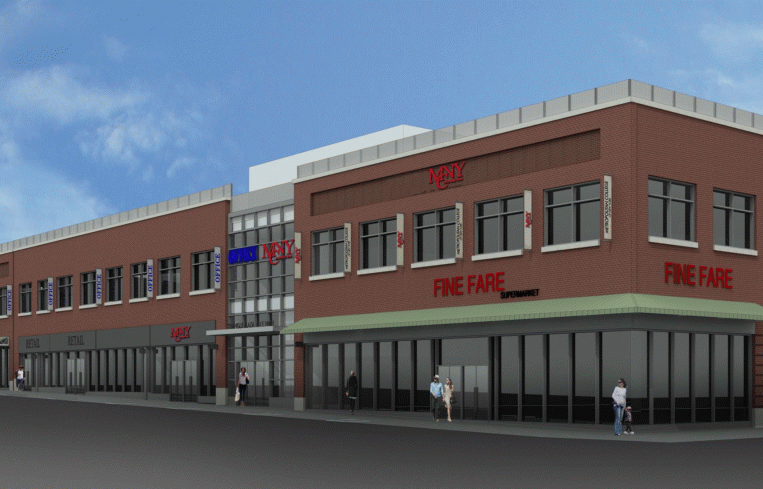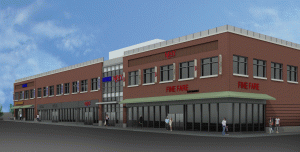Goldman Sachs, Triangle Equities Win Award For Creative Financing of Bronx Mixed-Use Project
By Guelda Voien October 30, 2014 11:52 am
reprints

After years of work wrangling would-be tenants and buyers and navigating the murky waters of city and state tax credits, Triangle Equities has emerged with a viable strategy for its Triangle Plaza Hub, a mixed-use development in the South Bronx. So viable is the arrangement the developer finally finagled, with the help of Goldman Sachs Urban Investments unit, that it even won an award for its use of tax credits.
The $35 million, 88,000-square-foot multi-use “hub,” at 149th Street in the Melrose neighborhood was first proposed in 2010 and saw many roadblocks along the way, according to the developers and the Goldman execs who worked to finance the project.
“When we originally started underwriting the transaction, we tried to do so based on conventional financing, but quickly discovered that the rents we were seeing in the South Bronx,” were not high enough for the project to pencil out, said Josh Weingarten, project manager for Triangle Plaza. “Construction costs, which are the same as in Manhattan, were creating a large gap in our capital stack.”
The zoning required parking if the mixed-use project was to include retail, which it does, and that meant adding space either on the roof or below grade—both of which are expensive, said Mr. Weingarten. With mounting expenses, Triangle began thinking of alternative ways to finance the project.
After hooking up with Margaret Anadu and Sherry Wang from Goldman, a financing structure began to take hold, though it took more than two years, the Goldman execs told Mortgage Observer in a recent interview.
The group decided to tap the New Markets Tax Credit program, with Goldman providing $10.3 million in equity through the program, and the New York State Healthy Food Healthy Communities fund, which ended up providing a $5.8 million loan. A Goldman Urban Investments fund also lent $14.8 million in a senior mortgage not under the Federal New Markets program.
But there was also the thorny issue of finding—and convincing—appropriate tenants to sign on the dotted line.
“The developer spent a long time trying to find the perfect usage,” said Ms. Wang. Because of the inclusion of a grocery store, the Healthy Food Healthy Communities Fund was able to contribute, and the New Markets credits were an easy choice because they did not specify that the project needed to be for any specific use, she added. But finding tenants for the office space proved a tough sell, according to Mr. Weingarten. Triangle was in talks with Metropolitan College for more than a year before the team came up with a solution: the college would assume some of the debt on the project as soon as the building was complete, buying its space as a commercial condominium.
“It was very important for Metropolitan College to own their own space,” Ms. Anadu said. The college wanted to own their space to protect against rent increases (it is currently located in Lower Manhattan). And really, this was the only way they were going to be able to afford the debt service on the buy—because the debt the non-profit college will be paying off is subsidized.
“[The transaction] could have cost another $1 million if not structured that way,” Ms. Anadu added.
The total cost of Metropolitan College’s new home is approximately $8.5 million, said a source close to the project who did not want to be identified.
The college put in a down payment, some equity and will assume about 70 percent of the overall price of the space in subsidized loans, according to Mr. Weingarten.
“This creative financing would let them purchase their condominium at a price that was essentially below the cost of construction,” he said.
With an anchor tenant in place, everything got much easier. While not entirely out of the woods—the project is 65 percent leased, according to Mr. Weingarten—other tenants have signed on in the last few months: a Boston Market restaurant and Vistasite Eye Care, as Commercial Observer has previously reported. Construction should be complete by the beginning of next year.
And last week the teams learned that the project had been named Qualified Low Income Community Investment of the Year by the Novogradac Journal of Tax Credits.
Now, Goldman and Triangle Equities are trying to take their show on the road. The two are teaming up again at a project called Arverne East in Brooklyn’s Rockaways section and Mr. Weingarten said he hopes to enlist Goldman’s help with a project in Staten Island called Lighthouse Point. That project is another answer by Triangle to an Economic Development Corporation Request for Proposal.
And the two firms have goals in line.
“We have performed well in the public private partnership world,” Mr. Weingarten said, and such projects will continue to be a focus for Triangle.
“We are a double bottom line investor,” Ms. Wang said of Goldmans Urban Investments group. “Some consider it a little cheesy, but we believe we can do well while doing good.”



